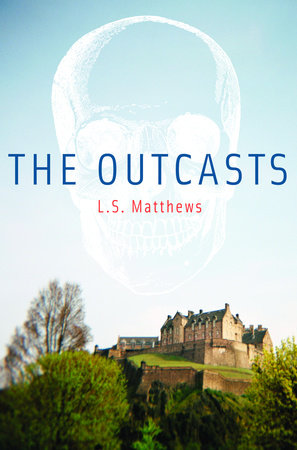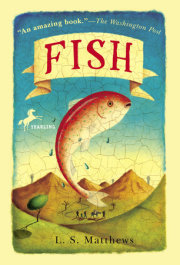Joe came across Iz on his way to Maths first thing on Monday morning.
He had been looking for his friend, but now he hung back for a moment, because he knew Iz well enough to see he was up to something, and Joe didn’t want to be caught up in it.
If there was trouble, Joe always seemed to be caught up in it, and, generally speaking, Iz was trouble. It fizzed from him in little blue lightnings Joe almost felt he could see. And it was very important right now that Joe did not get into trouble.
Joe stopped for a moment and eyed up Iz, who was gangling his thin, wiry frame into some kind of impossible sitting position on the high, narrow windowsill in the corridor. Screwing his top half sideways, his dark fringe flopped over his face, he seemed to be writing something. As few teachers ever succeeded in getting Iz to pick up a pen, this, in itself, was suspicious.
Two sixth formers were standing looking out of the window next to him. One of them—pale, medium-scrawny, with badly formed dreadlocks—called something to two girls down below in the quad.
Joe hardly had a moment to take this in. A fast-flowing river of students appeared behind him and swept towards him. When the first body collided with him, his bag took the brunt, and he barely staggered. Joe was a solid, square-shaped boy, somehow also round, and when he stopped, it was likely to create an impression in a narrow corridor full of stampeding fellow students.
Iz jumped down from the sill when he saw the pileup of pupils getting interesting.
Joe, with his short, dark hair unruffled, stood gazing at him thoughtfully, saying “Oof” at regular intervals as another boy cannoned into the scrimmage massing at his back. Further down the corridor, girls were now coming across the blockage of boys pushing and jostling each other. The girls stood back for a moment, then started protesting loudly that they could not pass through. One of the boys in front, trying to swing his bag at a neighbor, accidentally clipped a girl with a ponytail of long, golden curls.
She flashed her large, beautiful blue eyes, swore loudly above all the noise in the corridor, and drew back her arm to strike.
In the distance, through the mosh pit, Iz could see a pale jacket and a shining forehead approaching.
“Move, Joe,” he said, stretching out an arm and sweeping the larger boy alongside him before marching swiftly along the corridor. The dam removed, the river of students flowed behind, around and in front of them once more.
“What’s that?” Joe asked suspiciously, as Iz flourished a scrappy piece of white paper ahead of him. Iz did not answer but darted forward suddenly, between two girls, and lightly touched the paper onto the jacket of the dreadlocked sixth former, who was now in front of them. Wary of reading, Joe could still make out the words in black pen: please comb me.
He sighed.
“Iz, did you hear about the trip?”
“No, what trip?” asked Iz, but his eyes were not on Joe. He was carefully pulling at the key ring attached to the bag of the girl to one side of him. This successfully undid the zip, so that in a flash, Iz had her pencil case out of the bag. In only one more flash, he was doubled up on the floor with his hands around his head for protection.
Joe stood back again, this time avoiding chaos by backing against the wall, until the girl, with long, dark hair flying, had decided to stop hitting Iz with the pencil case in case she damaged any of its contents, and flounced off triumphantly.
Iz straightened up, laughing.
“What trip?”
“Weren’t you at registration?” said Joe, peevishly.
“I never go to registration,” said Iz.
“Why? We all have to go,” said Joe. “Well, if you’d been there, you’d have heard—that trip they asked us about ages ago, remember? We put our names down. Well, we’ve been picked out of the hat to go. Us! But we have to stay out of trouble—or we’ll lose our places.”
“Oh!” said Iz, for once lost for words.
There were lots of questions queuing up in his head, but at the moment, he couldn’t get over the fact he’d been chosen. He never got to go on trips—not even trips where there wasn’t a limit on places. Staff didn’t want to take boys like him. They never said so. There was always a reason—it was easy enough to find one. He was always temporarily excluded just as the trip was due, or something. He hadn’t been on a trip since he was little.
In the classroom, Iz took his place next to Joe, strangely quiet. He was torn between excitement and anxiety. Part of him was prepared for disappointment. It wouldn’t come off, there was bound to be a catch. He couldn’t even bear to ask Joe for more details.
Their teacher, a young woman still in training, noticed Iz’s quietness and wondered at it. She would have liked Iz if she had not had to try to teach him.
Copyright © 2007 by L.S. Matthews. All rights reserved. No part of this excerpt may be reproduced or reprinted without permission in writing from the publisher.




